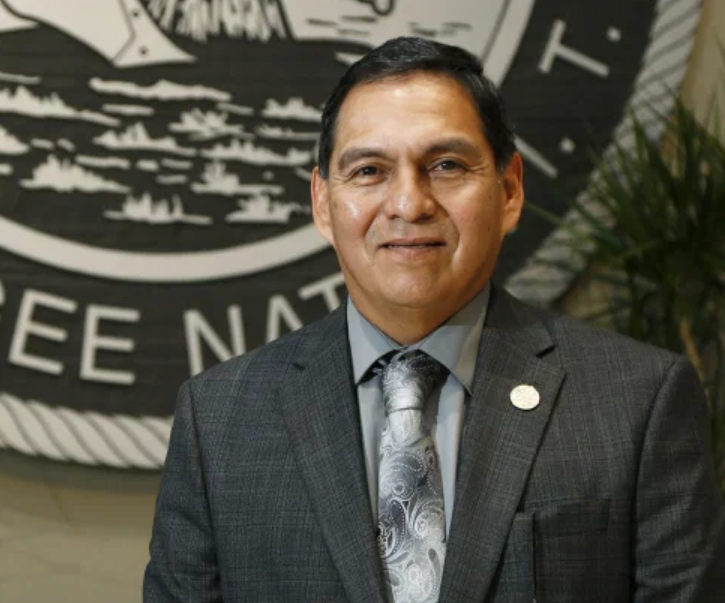TULSA, Okla. — The Muscogee (Creek) Nation and Cherokee Nation on Monday announced a pilot project to implement a Tribal Community Response Plan with U.S. Attorneys Trent Shores of the Northern District of Oklahoma and Brian Kuester of the Eastern District of Oklahoma.

The pilot project is in accordance with the U.S. Dept. of Justice’s National Strategy to Address Missing and Murdered Indigenous Persons that was rolled out on Nov. 22, 2019.
Principal Chief David Hill of Muscogee (Creek) Nation and Principal Chief Chuck Hoskin Jr. of Cherokee Nation joined the U.S. attorneys in making the announcement.
The goal for the Tribal Community Response Plan pilot project is to establish a collaborative response from tribal governments, law enforcement agencies, and other partners by implementing culturally appropriate guidelines when investigating emergent cases of missing and murdered American Indians and Alaska Natives.
Oklahoma’s U.S. attorneys are the first to launch the pilot project. Five other U.S. attorneys’ offices are slated to do so at later dates. Lessons learned from the pilot project will be used to improve the draft guides for developing a Tribal Community Response Plan before they are used in states across the country.
According to an Urban Indian Health Institute report that identified 506 cases of missing or murdered Indigenous women across 71 urban cities, including Tulsa and Oklahoma City, the state of Oklahoma has the tenth highest number of Missing and Murdered Indigenous Women and Girls at 18. Due to the lack of comprehensive and rural data available, the true numbers are likely higher.
“We are unquestionably at our strongest when partnering with agencies and tribes working toward our shared goal, and that is enhancing public safety and protection for those who need it most,” Principal Chief Hill said. “Unfortunately, we know all too well the challenges we face and the trends we must reverse regarding Missing and Murdered Indigenous People. We feel these types of collaborations, in which our input is sought and utilized to craft culturally specific guidelines, are the best path forward and we can’t wait to get started.”
Principal Chief Hoskin said the new Missing and Murdered Indigenous Persons Pilot Program is an important partnership with the United States Department of Justice and tribes.
“This pilot project will further a goal that we all share: to protect Cherokees on the reservation and bring missing Cherokees home to their families and communities,” Hoskin said. “When one of our Cherokee citizens is hurt or missing, it’s an emergency. And now this pilot program will help pool our focus and resources on these cases with immediate, coordinated and professional response plans.”
According to U.S. Attorney Trent Shores, with the pilot project, the Dept. of Justice further prioritizes public safety in Indian Country.
“The first step in achieving justice for missing and murdered Native Americans was acknowledging the injustice of any historical indifference to or neglect of these tragic cases. Now, it is time for action to tackle this crisis head-on,” Shores said. “I am proud to partner with the Muscogee (Creek) Nation and Cherokee Nation to announce the first of its kind pilot project to develop and implement protocols and community action plans for missing and murdered Indigenous people cases.”
U.S. Attorney Kuester said the Tribal Community Response Plans will unite people, agencies, and sovereigns committed to justice and liberty for all.
“Together we will identify and implement the best practices for responding to and investigating cases involving missing and murdered Indigenous people,” Kuester said.
More Stories Like This
Native News Weekly (August 25, 2024): D.C. BriefsScope Narrowed, Report Withheld: Questions Mount Over Michigan Boarding School Study
Zuni Youth Enrichment Project Announces Family Engagement Night and Spring Break Youth Programming
Next on Native Bidaské: Leonard Peltier Reflects on His First Year After Prison
Deb Haaland Rolls Out Affordability Agenda in Albuquerque
Help us defend tribal sovereignty.
At Native News Online, our mission is rooted in telling the stories that strengthen sovereignty and uplift Indigenous voices — not just at year’s end, but every single day.
Because of your generosity last year, we were able to keep our reporters on the ground in tribal communities, at national gatherings and in the halls of Congress — covering the issues that matter most to Indian Country: sovereignty, culture, education, health and economic opportunity.
That support sustained us through a tough year in 2025. Now, as we look to the year ahead, we need your help right now to ensure warrior journalism remains strong — reporting that defends tribal sovereignty, amplifies Native truth, and holds power accountable.
 The stakes couldn't be higher. Your support keeps Native voices heard, Native stories told and Native sovereignty defended.
The stakes couldn't be higher. Your support keeps Native voices heard, Native stories told and Native sovereignty defended.
Stand with Warrior Journalism today.
Levi Rickert (Potawatomi), Editor & Publisher

